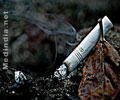Women who had been physically or emotionally abused are more likely to smoke, a new study has suggested.

ACEs can range from emotional, physical, and sexual abuse to neglect and household dysfunction and affect a large range of people.
In one of the largest studies of ACEs survey over 60 percent of adults reported a history of at least one event. ACEs are thought to have a long term effect on the development of children and can lead to unhealthy coping behavior later in life.
Since psychiatric disorders, including depression and anxiety, are known to increase the risk of smoking, researchers across the USA collaborated to investigate the effects of psychological distress on the relationship between ACE and current adult smoking. The ACE questionnaire was completed by over 7000 people, about half of whom were women.
Even after adjusting the data for factors known to affect a person's propensity for smoking, such as their parents smoking during the subject's childhood, and whether or not they had drunk alcohol in the previous month), women who had been physically or emotionally abused were 1.4 times more likely to smoke. Having had a parent in prison during childhood doubled chances of women smoking.
Psychological distress increases the chances that any person (male or female) will smoke.
Advertisement
Dr Strine continued, "Our results show that, among women, an underlying mechanism that links ACEs to adult smoking is psychological distress, particularly among those who have suffered emotional or physical abuse or physical neglect as a child.
Advertisement
The findings were published in BioMed Central's open access journal Substance Abuse Treatment, Prevention, and Policy.
Source-ANI















